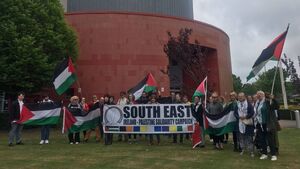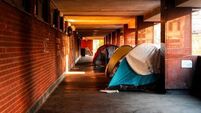Staff and students at SETU observe 76th year of Nakba

ISPC members and SETU staff and students at their Gather for Palestine protest on the university campus.
As the Israel-Gaza war enters into its 8th month, staff and students at South East Technological University (SETU) held a vigil on-campus in solidarity with the people of Palestine.
As of mid-May 2024, over 35,000 Palestinian people have been killed as a result of the war. A third of the victims are children.
Lecturer at SETU Dr Kate McCarthy stressed the importance of standing in solidarity with the people of Rafah, stating: "As educators, it is our moral duty to speak out against injustice and advocate for those whose voices are silenced. The situation in Rafah demands immediate attention and action from the international community."
Michelle Byrne, an IPSC South East branch member, said at the vigil: "We commend the courage and determination of SETU students and staff in taking a stand against the atrocities unfolding in Rafah. The IPSC South East stands with them in solidarity, and will continue to support efforts to keep the pressure on leaders and to demand justice."
On Wednesday, alumni, staff and students gathered at the Luke Wadding Library on the Cork Road, and silently walked through the SETU campus.
The vigil was organised by Gather for Palestine, who have staging weekly demonstrations in solidarity with Palestine.
The ongoing war has deeply affected many at SETU, especially in regard to the deaths of hundreds of academics, students and teachers and the destruction of all 12 universities in Gaza.
SETU offers Sanctuary Academic Scholarships in order to welcome refugees, asylum seekers and other migrants into the university community.
According to Dr McCarthy, two students from Gaza, a brother and sister, have been able to safely continue their studies in the South East thanks to the scheme.
Wednesday, May 15, 2024, marked the 76th anniversary of Nakba, the day that thousands of Palestinians were forcibly removed from their land to make way for the formation of the State of Israel, after the end of British rule over the territory.
Nakba, which means ‘disaster’ in Arabic, refers to the 700,000 Palestinians who fled for safety to neighbouring countries, including Jordan, Egypt, Lebanon and Syria.
In the intervening 76 years, Palestinians have systematically been uprooted from their homes by Israeli settlers, in contravention of international law.
The current phase of the Israel - Palestinian conflict is the most devastating since 1948.
On October 7, Hamas militants captured and killed 1,200 Israeli civilians attending a music festival near Gaza.
As of May 2024, around 130 hostages are still unaccounted for.
In response to the attacks by Hamas, the Israeli military launched missile strikes, air-raids and ground assaults into Gaza.
The military actions have effectively destroyed nearly all local infrastructure, especially hospitals and universities, and have trapped thousands of people in rubble.
The southern city of Rafah is the next target for the Israeli military, with thousands of people currently being forced to leave their homes.
Before this latest offensive, Rafah was the refuge for 1.4 million people from Gaza.
Protests have emerged in third-level institutions across the country in response to the ongoing destruction in Palestine.
At Trinity College Dublin, students held a five-day encampment in a successful bid to divest all university ties with Israeli links.
In University College Dublin, an encampment began in May in protest at the university’s ties to Israeli-based sponsors, partners and shareholders.
President of UCD Professor Orla Feely has since denied any active links between Israel and the university.
On Tuesday, May 14, another encampment was erected in University College Cork, with an estimated 40 students taking part.






